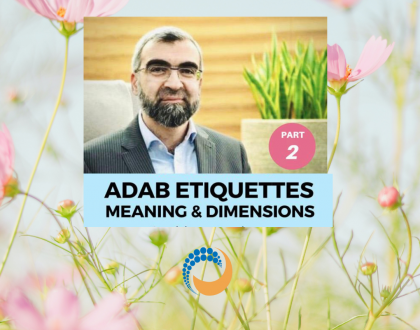Expecting the Unexpected when you seek Knowledge

by Abu Shama
Does Allah really suffice People of Knowledge?
‘Whosoever acquires an understanding of the religion of Allah, Allah suffice him in his, matters of concerns and provides him sustenance from source which he could not expect.’
(Abu Hanifah heard Abdullah Ibn Jaz’ relate what the Prophet (peace be on him) said in Makkah)
Allah Almighty facilitates everything for ordinary people who are just working and living in the world, would He not facilitate a living for people who are trying to attain the nearness to him?
People often equate provision with simply material acquisition; however knowledge is also a provision from Allah Almighty, the more one is given knowledge and understanding, the more his life is facilitated for him by Allah Almighty.
Abu Hanifah was a young boy when he traveled to Makkah with his father on a business trip. He saw a crowd of people gathered around a man: Abu Hanifah asked his father; ‘There are a lot of people gathered around this man’. His father replied ‘Let us go and see what is there’.
There he (Abu Hanifah) met the Companion Abdullah Bin Jaz (a not so well known Companion; barely the students of knowledge knew him). Abdullah was narrating the hadith ‘Whosoever acquires an understanding of the religion of Allah, Allah suffice him in his, matters of concerns and provides him sustenance from source which he could not expect.’
The example of a person of knowledge leaving Allah to suffice all his needs, is the one who says:
‘O Allah I am putting myself under your trust and care, so you take care of me better than I take care of myself’
At-Tanookhi related in al-Faraju B’ada as-shiddah a story of a man who fell in to a state of dire poverty. All doors of ease were shut tight before him. On one particular day his situation became so frightful that he and his family had nothing whatsoever to eat in their house. He later said:
‘The first day we went hungry, the second passed in a similar fashion, and when the sun was about to set, my wife said to me, ‘go out, and find anything that you can for us to eat, for we are on the verge of dying. I remembered a female relative of mine and set out for her home and upon meeting her, I informed her of our pathetic situation.
She said that I have nothing in the house to give to you other that a rotten fish. I told her to give it to us nonetheless, since we were very close to starving. I took it home with me, slit it open and on to my astonishment, I found a pearl lodged in its stomach. I sold it for thousands of dinars and then informed my relative of what happened. She said that she would only take a share of the proceeds, and not everything. My situation improved greatly after that occurrence, and I furnished my house from my share of the profits. And I knew that it was the kindness of Allah and nothing else.’
Allah Almighty will provide his servant, He says in the Qur’an:
‘And He will provide from [sources] he never could imagine’
[Qur’an 65: 3]
We have seen already that the knowledge seeker has to struggle and strive to gain knowledge of his religion. He has dedicated his time, effort and his wealth or potential wealth to acquire an understanding in the religion. And now with his new-found knowledge, his responsibility has increased further. He is the soldier who is bearing the responsibility of carrying and spreading the words of Allah Almighty, and teaching people the message of the Prophet (peace be on him). Allah Almighty does not want his servant to be distracted by matters of concerns from his task at hand, and all of which requires sincerity and devotion in him conveying the message. Allah Almighty assures him that He will sustain him and provide for him from avenues that he did not expect.
Sacrifice your time and money and Allah will give, when you were created you did not have any wealth whatsoever, no money, no bank accounts and then Allah provided you with what you have today. Allah Almighty can take it, and He can give more. He created you and together with your rizk (sustenance); therefore you will obtain your sustenance sooner or later.
This is a series compiled following lectures on ‘The Manners and Etiquette of the Teacher and the Students’. The course was based on a book written by Shaykh al-Islam, Badr al-Din Ibn Jama’ah and conveyed to us by our Shaykh Haytham Tamim.
Qadi al-Qudat, Shaykh al-Islam, Badr al-Din Ibn Jama’ah was born in 639 AH (1241 AD). Originally from Syria and later moved to Egypt. He was educated at Hama, achieved excellence in religious studies and jurisprudence, and became a leading promoter of the Shafi’i Fiqh. Eventually, he attained the high status of Shaykh al-Islam and held the high position of Chief Justice. Imam al-Dhahabi has observed that Qadi Ibn Jama’ah was well versed both in prose and poetry, and had left abundant notes on Fiqh, Hadith, Usul al-Fiqh, and Tarikh(History). He commanded respect and influence, and had a large number of students and followers. He died at Cairo in the year 733 A.H. (1332 A.D.), aged 94, and was buried by the side of the great Imam Shafi’i.
His book on the subject of Adab al-Alim wal-Mutaalim
It was in the year 672 AH (1273 AD) that Ibn Jama’ah completed this book as a guide for both students and teachers to help improve quality of their academic life and work.
Suggested Books:
Ibn Jama’ah – Etitquettes of Seeking Knowledge
Abd Al Barr – Jami’ Bayan Al Ilm
Al Khateeb Al Baghdadi – Al Jami’ li Akhlaq Al Rawi
Recommended Posts

What is the best source of income?
September 01, 2023

Can playing with children be an act of worship?
February 21, 2023


